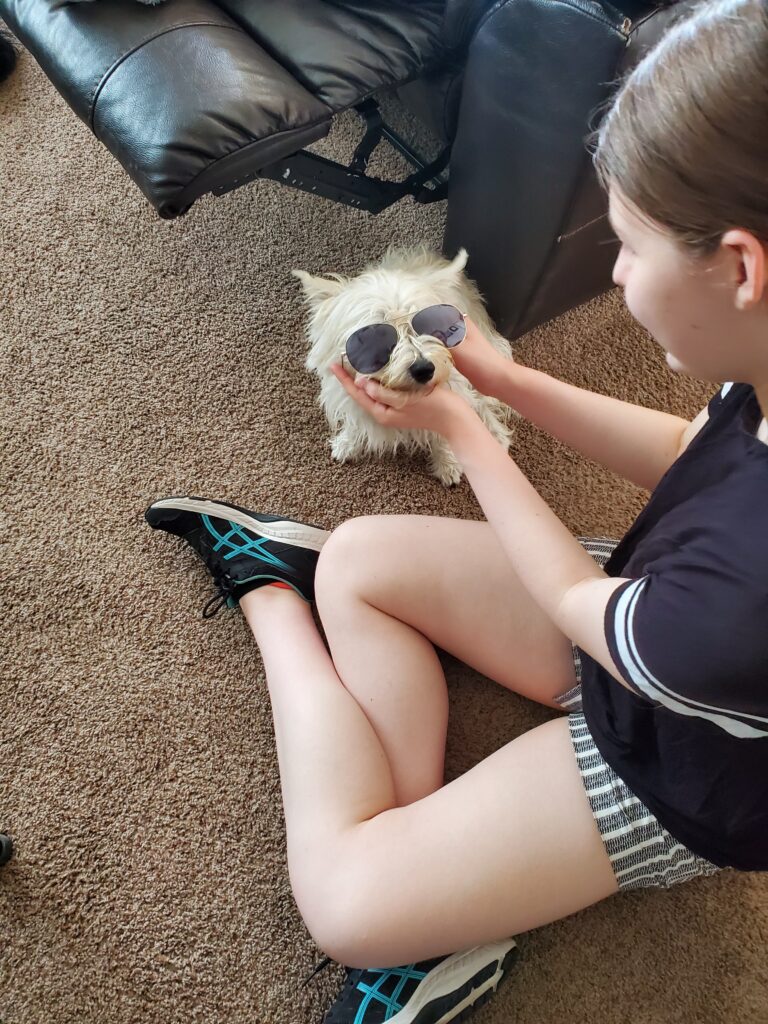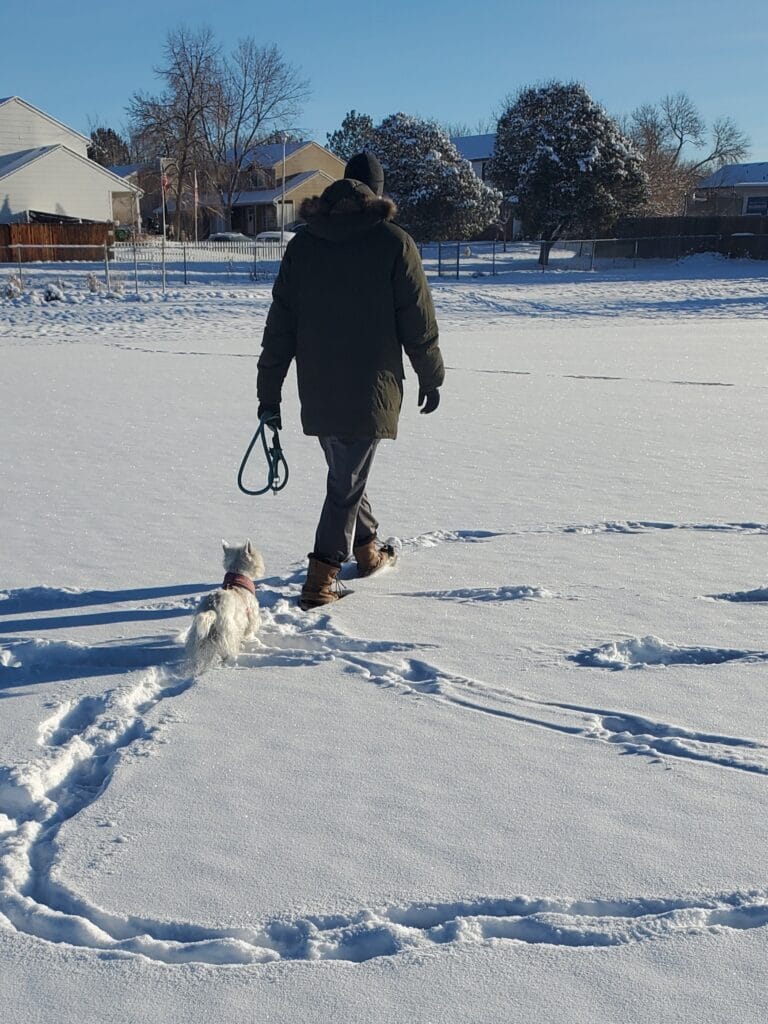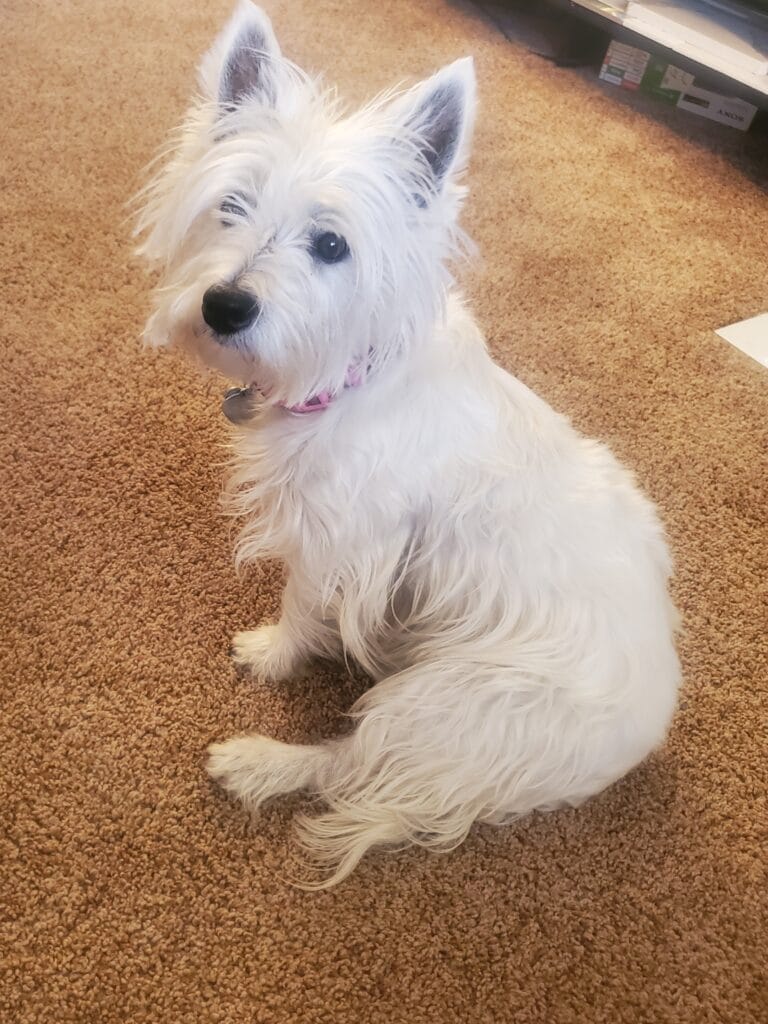 (Or My Cat, Hampster, Lizard, or other Pet) In my family, I think of my dogs as being my canine children. I currently have two canine children to go along with my three human children. I don’t treat my human children exactly the same as my canine children, but I do treat the dogs well. My dogs sleep in cages at night, while the humans get beds and bedrooms instead, so I do treat my human children better than my dogs, but I still think of my dogs as my children, and I want to make sure the dogs are cared for if I pass away. I don’t need to name a guardian to raise my dogs the right way, like I would for my children, but I do need to make sure the dogs are cared for properly.
(Or My Cat, Hampster, Lizard, or other Pet) In my family, I think of my dogs as being my canine children. I currently have two canine children to go along with my three human children. I don’t treat my human children exactly the same as my canine children, but I do treat the dogs well. My dogs sleep in cages at night, while the humans get beds and bedrooms instead, so I do treat my human children better than my dogs, but I still think of my dogs as my children, and I want to make sure the dogs are cared for if I pass away. I don’t need to name a guardian to raise my dogs the right way, like I would for my children, but I do need to make sure the dogs are cared for properly.
Not everyone cares for their dogs the same way I do. I also recognize that people love their other pets as much as I love my dogs. My wife and oldest child are allergic to cats, so we don’t have cats, but we have had different pets through the years. A fish, a toad, and a hermit crab have all had brief stays at our house. I recognize that all pets are important to plan for in your estate plan. You need to pick who will care for your pets, how you may provide for the pets, and the level to which you want to provide for their care. I have dogs, so I will mostly discuss dogs in this blog. When I talk about dogs in this post, everything I say is applicable to all pets and estate planning.
As with anything else in estate planning, you can be as complicated, or as simple as you want in providing for your pet. You can leave your pet to a family member, and leave the family member money to care for the pet, or you can even go so far as to set up a pet trust. The first major decision you need to make is who will take the pet – how much money to leave to care for the pet comes after that.
How I Personally Set Up My Will for My Dogs and Children, and How to Decide Who Should Take Your Pet When You Die
 In your will, you can designate who will take your pet. My will says that if I die, whoever takes over raising my children will also need to take the dogs. Since my dogs are like family, I think it would be quite terrible for my children to lose their parents, and then have their dogs be taken away, too. My dogs have provided a lot of joy, care, and comfort to my children – my oldest child could not go to sleep without a dog for a long time – and I want the dogs and kids to stay together. That is how I set up my will.
In your will, you can designate who will take your pet. My will says that if I die, whoever takes over raising my children will also need to take the dogs. Since my dogs are like family, I think it would be quite terrible for my children to lose their parents, and then have their dogs be taken away, too. My dogs have provided a lot of joy, care, and comfort to my children – my oldest child could not go to sleep without a dog for a long time – and I want the dogs and kids to stay together. That is how I set up my will.
I know the person who will take my kids will also be willing to take my dogs, but that isn’t always the case. My father-in-law is less fond of dogs than I am, and views them more of a nuisance than anything else. I certainly do not want my dogs to go to my father-in-law, so I have designated who should receive the dogs by name in my will. You can do the same in your own will.
How Can I Provide Moneys to Care for My Dog When I Die?
 When I give my dogs to my family members, I don’t want to say “Good Luck! Have Fun! And I Hope They Don’t Cost Too Much (LOL),” but rather I want to ensure the dogs are cared for properly. Because of this, I designated some money to be used in caring for the dogs in the will. I gave the money to the person who is taking the dogs, and I am trusting they will use the money for the purpose of caring for the dog, and not for themselves. This is a common way to leave money to care for the dogs…you can designate the person to take the dog, and also designate a sum of money to go to the person, with instructions to care for the dog.
When I give my dogs to my family members, I don’t want to say “Good Luck! Have Fun! And I Hope They Don’t Cost Too Much (LOL),” but rather I want to ensure the dogs are cared for properly. Because of this, I designated some money to be used in caring for the dogs in the will. I gave the money to the person who is taking the dogs, and I am trusting they will use the money for the purpose of caring for the dog, and not for themselves. This is a common way to leave money to care for the dogs…you can designate the person to take the dog, and also designate a sum of money to go to the person, with instructions to care for the dog.
If you are concerned the money would be used for an improper purpose, you can set up a pet trust to preserve money to care for the dog. I have written about pet trust in a different blog that you can find here. Basically, you can set aside money to care for the pet. A pet trust can last for 21 years, or the life of the animal, whichever is shorter, under Colorado law. I have some clients who adopt stray dogs and keep them on their 40 acres of land. They want to care for the 40+ dogs they have after they are gone, so they established a pet trust to care for the dogs.
Who Should Take My Dog When I Die?
 Only you can choose who you will take your dog (or cat, or hampster, or lizard, or other pet) and you need to choose that person carefully. As I said earlier, my father-in-law is not a big dog person, so I don’t want to choose him. Some of my other family members have cats that don’t get along with any dogs, so it is probably not the best idea to leave the dogs to those family members. I know my family members and who will take the dogs and who will care for them properly. You know your family and who will take care of your pet properly. When you think about who you want to designate to care for your pets after you die, you want to clearly identify who will get the pet in your will, as you want to avoid misunderstandings.
Only you can choose who you will take your dog (or cat, or hampster, or lizard, or other pet) and you need to choose that person carefully. As I said earlier, my father-in-law is not a big dog person, so I don’t want to choose him. Some of my other family members have cats that don’t get along with any dogs, so it is probably not the best idea to leave the dogs to those family members. I know my family members and who will take the dogs and who will care for them properly. You know your family and who will take care of your pet properly. When you think about who you want to designate to care for your pets after you die, you want to clearly identify who will get the pet in your will, as you want to avoid misunderstandings.
Avoid Misunderstandings About Your Pets, Put It In Your Estate Plan
Don’t let a misunderstanding happen to you! Clearly state who should get your dog (or other pet) in your will. You can leave the person caring for your pet money, or you can set up a pet trust, but no matter what you do, don’t forget to account for one of your most precious assets – your pet – in your will!

 720-730-7274
720-730-7274









